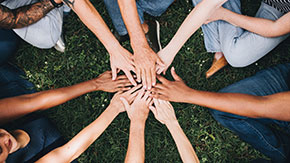
More is better when coordinating with others, according to new study; Atsushi Takagi, WRHI specially appointed assistant professor
Press Releasesおすすめ
More is better when coordinating with others, according to new study
Dr. Atsushi Takagi at Bio Interface Research Unit and other researchers has demonstrated that physical coordination is more beneficial in larger groups.
The new study, published in eLife, extends this finding to trios and quartets by clarifying haptic communication in groups critical to society.
The researchers used robotic interfaces to test coordination in groups of two, three and four partners, and found that performance was overall better in larger groups.The researchers believe the findings will improve the outcomes of rehabilitation by training patients in groups.Scientists from Imperial College London, France and Japan previously showed that performance at a physical task is learned better when practicing with a partner in pairs, like dancing the Tango.
Dr Atsushi Takagi, lead author of the study who resides at the Institute of Innovative Research at Tokyo Institute of Technology (Tokyo Tech), said: “We were shocked by how fast partners learned to coordinate as a group through touch. Imagine trying to move a banquet table at a crowded wedding venue. With verbal communication, it’s immensely challenging to coordinate with others to ensure the table doesn’t bump against something, and the more people there are, the longer it takes to reach verbal consensus. With touch, coordination emerges in a matter of seconds, and the time taken to reach consensus is the same, irrespective of group size.”
The researchers found that the key to physical coordination was the ability to infer the group’s goal through touch. The same coordination mechanism was used in a previous study by Takagi and colleagues to design a “human-like” robot partner that coordinated with a human partner.
In the new study, the researchers conducted computer simulations of the task to test what information was shared within the group through touch. Takagi believes that a deeper understanding of the coordination mechanism will yield an algorithm for a group of robots to carry out physical tasks together.
The research was carried out in partnership with Imperial College London in the UK, and the University of Tokyo in Japan.
Reference
Atsushi Takagi1,2, Masaya Hirashima3, Daichi Nozaki3, Etienne Burdet2, “Individuals physically interacting in a group rapidly coordinate their movement by estimating the collective goal”, eLife, DOI: https://doi.org/10.7554/eLife.41328
- Institute of Innovative Research, Tokyo Institute of Technology.
- Department of Bioengineering, Imperial College London.
- Graduate School of Education, University of Tokyo.
*Corresponding authors email: takagi.a.ae@m.titech.ac.jp
